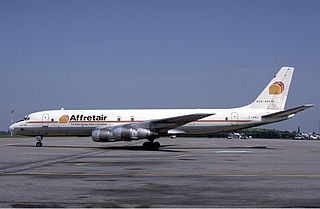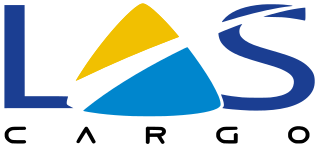Fleet

| |||||||
| Founded | 1977 | ||||||
|---|---|---|---|---|---|---|---|
| Ceased operations | 1982 | ||||||
| Hubs | Luton Airport | ||||||
| Headquarters | Horley | ||||||
Redcoat Air Cargo was a British cargo airline between 1976 and 1982 with headquarters at Horley in Sussex and an operating base at Luton Airport.
The company started operations in 1976 using a Bristol Britannia leased from Geminair. It used the aircraft to operate cargo flights from the United Kingdom to West Africa. It later bought its own Britannias, several being ex Royal Air Force Transport Command aircraft (including at least one previously operated by Air Faisal), [1] and by 1979 was also operating freight charters for the Ministry of Defence.
The crash of the Britannia in 1980 led to the purchase of a Canadair CL-44 from British Cargo Airlines. Delay in acquiring the aircraft from the official receiver and subsequent engine problems led to cash flow issues and in 1982 the company entered voluntary liquidation. [2]

In 1980 one of the company's Britannia aircraft was used in a BBC television drama series Buccaneer about a cargo airline. [5]
On 16 February 1980 a Bristol Britannia C Mk.1, registered G-BRAC, crashed after departure from Boston-Logan due to ice and snow on the aircraft; seven of the eight occupants died, including the spouse of a serving airman at RAF Belize. [6]

Cargolux, legally Cargolux Airlines International S.A., is the flag carrier cargo airline of Luxembourg with its headquarters and hub at Luxembourg Airport. With a global network, it is among the largest scheduled all-cargo airlines in the world. Charter flights and third party maintenance are also operated. It has 85 offices in over 50 countries as of 2018, and operates a global trucking network to more than 250 destinations.

The Bristol Type 175 Britannia is a retired British medium-to-long-range airliner built by the Bristol Aeroplane Company in 1952 to meet British civilian aviation needs. During development two prototypes were lost and the turboprop engines proved susceptible to inlet icing, which delayed entry into service while solutions were sought.

Canadair Ltd. was a Canadian civil and military aircraft manufacturer that operated from 1944 to 1986. In 1986, its assets were acquired by Bombardier Aerospace, the aviation division of Canadian transport conglomerate Bombardier Inc.

Flying Tiger Line, also known as Flying Tigers, was the first scheduled cargo airline in the United States and a military charter operator during the Cold War era for both cargo and personnel. The airline was bought by Federal Express in 1989.

Affretair was a cargo airline based in Zimbabwe.

The Canadair CL-44 was a Canadian turboprop airliner and cargo aircraft based on the Bristol Britannia that was developed and produced by Canadair in the late 1950s and early 1960s. Although innovative, only a small number of the aircraft were produced for the Royal Canadian Air Force (RCAF), and for commercial operators worldwide.

The Conroy Skymonster (CL-44-0) is a 1960s United States specialized cargo aircraft based on the Canadair CL-44 freighter, with an outsize fuselage.
Buccaneer is a television series, made by the BBC from 1979 to 1980. Created by experienced television writer N. J. (Norman) Crisp, it was broadcast over 13 weeks from April to July 1980.
British United Air Ferries (BUAF) was a wholly private, British independent car and passenger ferry airline based in the United Kingdom during the 1960s. It specialised in cross-Channel ferry flights carrying cars and their owners between its numerous bases in Southern England, the Channel Islands and Continental Europe. All-passenger and all-cargo flights were operated as well. Following several identity and ownership changes, it went out of business in 2001.
Lloyd International Airways Ltd was a private, British independent airline formed in 1961 to operate worldwide charter flights. It commenced operations with a single Douglas DC-4 piston airliner from Cambridge Marshall Airport. Lloyd International concentrated on passenger and cargo charters with four-engined, long-range aircraft. It also had links in Hong Kong since its inception and flew to the Far East regularly. During the mid-1960s, the airline began re-equipping its fleet with Bristol Britannia and Canadair CL-44 turboprops, all of which featured large cargo doors and palletised freight systems. Long-range Boeing 707 jets joined the Lloyd International fleet during the early 1970s for use on affinity group passenger and freight charters to North America and the Far East. Lloyd International ceased operations in June 1972.

International Aviation Services Limited, trading as IAS Cargo Airlines from 1975, is a defunct wholly privately owned, independent British airline that was based at London Gatwick Airport in the United Kingdom. It commenced operations in 1967 and went bankrupt in 1980, following a merger with London Stansted based Trans Meridian Air Cargo (TMAC) to form the short-lived British Cargo Airlines.

The Canadair North Star is a 1940s Canadian development, for Trans-Canada Air Lines (TCA), of the Douglas DC-4. Instead of radial piston engines used by the Douglas design, Canadair used Rolls-Royce Merlin V12 engines to achieve a higher cruising speed of 325 mph (523 km/h) compared with the 246 mph (396 km/h) of the standard DC-4. Requested by TCA in 1944, the prototype flew on 15 July 1946. The type was used by various airlines and by the Royal Canadian Air Force (RCAF). It proved to be reliable but noisy when in service through the 1950s and into the 1960s. Some examples continued to fly into the 1970s, converted to cargo aircraft.
Northeast Airlines (NEA) – known as BKS Air Transport until 1970 – was an airline based in the United Kingdom that operated from 1952 until 1976, when its operations and fleet merged into British Airways.
Transmeridian Air Cargo was a British cargo airline that operated from 1962 until 1979 when it merged with IAS Cargo Airlines to form British Cargo Airlines.

Air Charter was an early post-World War II private, British independent airline formed in 1947. The airline conducted regular trooping flights to Cyprus as well as worldwide passenger and freight charter flights from its bases at Southend Airport and Stansted. Following Freddie Laker's acquisition of Air Charter in 1951, Aviation Traders and Aviation Traders (Engineering) became associated companies. From 1955, it also operated scheduled coach-air/vehicle ferry services. These initially linked London and Paris. In 1958, the process of transferring Air Charter's coach-air/vehicle ferry operation to sister company Channel Air Bridge began. In 1959, Air Charter became part of the Airwork group. In 1960, Airwork joined with Hunting-Clan to form British United Airways (BUA).
Hunting-Clan Air Transport was a wholly private, British independent airline that was founded in the immediate post-World War II period. It began trading on 1 January 1946 as Hunting Air Travel Ltd. It was a subsidiary of the Hunting Group of companies, which had come from the shipping industry and could trace its history back to the 19th century. The newly formed airline's first operating base was at Bovingdon Airport in Southeast England. Its main activities were contract, scheduled and non-scheduled domestic and international air services that were initially operated with Douglas Dakota and Vickers Viking piston airliners from the company's Bovingdon base. A change of name to Hunting Air Transport occurred in 1951. By that time, the airline had emerged as one of the healthiest and most securely financed independent airlines in Britain.
Transporte Aéreo Rioplatense SACL was an Argentine cargo airline that operated in the 1970s and 1980s.

Líneas Aéreas Suramericanas S.A.S was a cargo airline based in Bogotá, Colombia. It operated scheduled and chartered cargo flights to Latin America and the Caribbean. Its main base was El Dorado International Airport, Bogotá.

Air Faisal is a defunct cargo airline based in the United Kingdom, which operated a fleet of Bristol Britannia freighters during the 1970s.